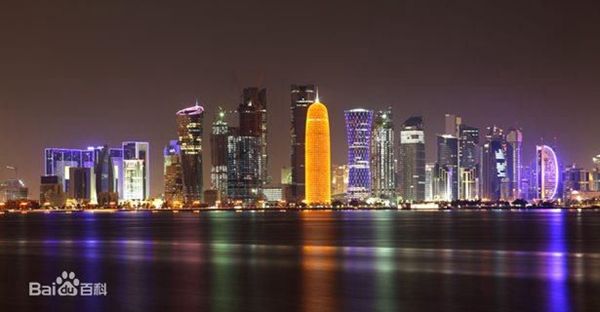No breakthrough in Qatari impasse, but hope remains
- By Sabena Siddiqui
 0 Comment(s)
0 Comment(s) Print
Print E-mail China.org.cn, August 11, 2017
E-mail China.org.cn, August 11, 2017
|
|
|
Qatari Capital Doha [File photo] |
Attempting to solve the Qatar impasse, Kuwait's mediation proved futile even though it had powerful Western support. For a third month, Saudi Arabia continues to close its land border with Qatar, while the entire bloc it leads has cut air and sea links.
In practical terms, it's the worst crisis since the Gulf Cooperation Council was created, as the only GCC members not boycotting Qatar have been Kuwait and Oman.
Initially putting forward 13 demands, Saudi Arabia, UAE, Bahrain and Egypt cut off ties on June 5 leaving no room for compromise. Relentlessly pursuing an aggressive stance even as Qatar denied all the allegations against it, the four states demanded full compliance with the demands before anything else.
Later, the bloc set out six principles for implementation, with the 13-point list seemingly abandoned, and Al Hayat, the leading pan-Arab daily newspaper, reported just before the second foreign ministers meeting in Manama, that sanctions were likely to be imposed "that will gradually affect the Qatari economy."
Unexpectedly, there was a positive development at the Manama meeting in that the Saudi-led bloc expressed willingness for dialogue with Qatar to ease the dispute if the latter gave in to certain specific demands.
Announcing no new economic sanctions, Saudi Foreign Minister Adel al-Jubeir spoke at a televised conference that his government rejected Qatar's attempts to politicize the entry of Qatari pilgrims to the kingdom. However, "we are ready to talk with Qatar on the implementation of the demands, on the implementation of the principles, if it is serious, but it's clear that it's not."
Continuing the pressure, Bahrain's Shaikh Khalid bin Ahmed al Khalifa said: "The real [mediation] role has been since the beginning that of His Highness the Emir of Kuwait, and we pray for its success."
He went on to say that, based on the six principles, "The four countries are ready for dialogue with Qatar with the condition that it announces its sincere willingness to stop funding terrorism and extremism and makes a commitment to not interfere in other countries' foreign affairs."
Even in previous discussions, representatives of the bloc had agreed the only way to settle the crisis was an in-house Gulf solution, ruling out any foreign mediation. This is understandable, as all these states are closely inter-linked with mutual interests and dense family connections.
However, Shaikh Khalid noted that there was no need to be overly "optimistic" about a settlement unless Qatar gave a satisfactory response. Even so, the atmosphere seems relatively pacific in contrast to the previous meeting in Cairo, which was not made public but has been described as "negative."
Meanwhile, Qatar has from the very start rejected the 13-point list as an affront to its sovereignty while trying to contain terrorism financing and revising its counter-terrorism laws. Based on statements attributed to the Emir of Qatar himself, the dispute has to be handled sensitively.
Qatar Foreign Minister Mohammad Al-Thani says the sanctions violate international laws. "There isn't a clear vision (from the Manama meeting), there is only a stubborn policy from the blockading countries and refusal to admit that these are illegal actions."
According to Qatar's Defence Minister Khalid bin Mohammad al Attiyah, there are some signs of movement towards resolving the crisis. He said: "Qatar, since day one, has been calling for dialogue and I think today this language is prevailing in the GCC."
He noted that demand number 12 of the 13 states that, if Qatar does not reply within 10 days all the demands are null and void. That is already the case, but Qatar is willing to discuss any of the blockading countries' concerns.
He added that, if Gulf countries continue with "the stalemated situation, [the GCC] will be jeopardized," but that "the wisdom of [Kuwaiti Emir Sabah Al-Ahmad Al Jaber Al Sabah] will not let it go this far."
With its air space drastically compromised, Qatar recently requested the International Civil Aviation Organization (ICAO) to call a special meeting as Saudi Arabia was supposed to provide emergency air corridors that could not be confirmed to the Qatar side.
Notably, another positive indication is that the Saudi state news agency said these air corridors would be open from Aug. 1, saying that, "Nine corridors have been identified including one in international air space over the Mediterranean that will be monitored by the Egyptian authorities."
Significantly, tempers in the region are gradually simmering down, symbolized by the foreign ministers of Iran and Saudi Arabia shaking hands at the recent OIC meeting. After much bitterness previously, it is a sign of hope for the critical Iran-Saudi Arabian relationship as well.
Sabena Siddiqui (Twitter: @sabena_siddiqi) is a foreign affairs journalist and lawyer based in Pakistan.
Opinion articles reflect the views of their authors, not necessarily those of China.org.cn.







Go to Forum >>0 Comment(s)